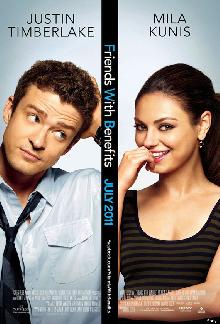
FRIENDS WITH BENEFITS
US, 2011, 109 minutes. Colour.
Justin Timberlake, Mila Kunis, Patricia Clarkson, Jenna Elfman, Richard Jenkins, Bryan Greenberg, Woody Harrelson, Shaun White.
Directed by Will Gluck.
There is something distinctive about so many of the American romantic comedies in recent times. When we say ‘romantic comedy’, many of us think of the rather nice romances of the past, G or PG in their style and humour, or the ‘screwball comedies’ which were so popular in the 1930s and have become classics. Think It Happened One Night – which is now almost eighty years old. 21st romantic comedies tend not to be G or PG rated. Friends with Benefits is one of these.
The modern romantic comedy has a lot of screwball behaviour and jokes (I hadn’t intended any innuendo when I just typed this but I realised immediately that it is there and is relevant). But, the language is often direct and frank. The situations are also often direct and frank and not neatly moral. Sex scenes are often not inhibited. But, with the most popular of them, especially those produced and/or directed by Jud Apatow, they start looking and sounding rather raucous and permissive. But, the characters go through some painful experiences. They gain some wisdom. They finish up with an emphasis on commitment that they did not anticipate at the beginning.
The best of these contemporary romantic comedies, which many older audiences are put off because of their directness and tend to think of as offensive, make some sense to the audience in their 20s and 30s and are alerts to this audience that relationships, friendships and love require something deeper than the original shenanigans.
Friends with Benefits starts with two couples breaking up. One, he, in Los Angeles, is an art designer for a website. One, she, in New York, is a headhunter of talent for companies. When they meet in New York where she wants to recruit him to work for the magazine, GQ, they click. Wanting to avoid the clichés of popular romantic comedy and movies (which they list and the movie sends up, often quite amusingly), they decide that sex is possible, not love, while they become best friends. Needless to say, ultimately they...
Justin Timberlake does very well as Dylan, the designer, who is reserved in emotions, protecting his deeper self. Mila Kunis is vivacity personified as Jamie, an intense theorist about friendship, cautious about love, but who falls in love despite herself. The characters are better written and performed than in many similar films.
Patricia Clarkson as Jamie’s lighthearted wayward mother and Richard Jenkins’ as Dylan’s sympathetic father struggling with Alzheimers are able to offer advice and urge their children on to love.
There are some funny one-liners and incidental jokes, a send up of gooey romance films and Woody Harrelson as the flamboyantly gay sports editor at GQ.
This is life as it is rather than as it should be – except that it acknowledges this and tries to do something about it.
1. The title, expectations?
2. Romantic comedy? 21st century style? In comparison with the old screwball comedies? The later quieter romantic comedies?
3. The target audience, men and women in their twenties and thirties? The response of older audiences? The difference between identifying with characters and observing them?
4. The Los Angeles settings? The web office? Pace? The water, at the beaches? The sequence on the Hollywood sign?
5. The contrast with New York City, the GQ headquarters, apartments and restaurants, the streets, the stations?
6. The device of the opening, the two different conversations? Audiences expecting the central characters to be conversing – but not? The issues of the two couples? The interchange between the characters? The break-up, the reasons, remaining friends?
7. Dylan, Justin Timberlake, emotions, his work on the website, the offer being made to go to New York, his decision, meeting Jamie, her urgency? Trying to convert him to New York City? The music in the streets, the dancing in the streets? The later dancing at Grand Central Station? His agreement, the contract?
8. Jamie, her personality, her work, being in favour of Dylan, meeting him at the airport, the zany sequence on the luggage belt? The notice? Meeting him, persuading him, her enthusiasm, her getting a bonus?
9. The nature of friendship, talking, the theories about friendship, sexual relationships? Their friendship, the role of sex? Style, effect? Their sharing things together?
10. Tommy, the sportswriter, his personality, overtly gay, camp style, his talk, flirting? At work? His boat, helping out with Dylan’s father? The photo shoot and its camp style?
11. Jamie’s mother, her arrival, a free spirit, the atmosphere of the 70s, not knowing who Jamie’s father was? Her talk, the men in her life, her past? Eventually talking as a mother to her daughter, their bonding, her advice?
12. Dylan and his success, its effect? His dating?
13. Going to Los Angeles, his father and the story, not wanting to wear pants, his memory going, the memories of his wife and her walking out, the meals, his nurse?
14. Annie, her love for her father, for her brother, her life story, her husband, children, advice? Dylan bonding with the boy?
15. Jamie’s arrival in Los Angeles, at home, being welcomed, the night with Dylan, Annie seeing it, the problems, the episode at the Hollywood sign?
16. Jamie overhearing Dylan and his talk with his sister, her decision to leave, refusing contact?
17. The scene on the New York rooftop, Jamie’s special place, Dylan upset at her not returning his calls, knowing that she would be on the rooftop, her being hurt, his going to reconcile?
18. Going to Los Angeles, the decision?
19. The picture of the parent generation – and eccentricities and comedy?
20. The final apology, friendship, the nature of their love, sharing everything, leading to ultimate commitment?